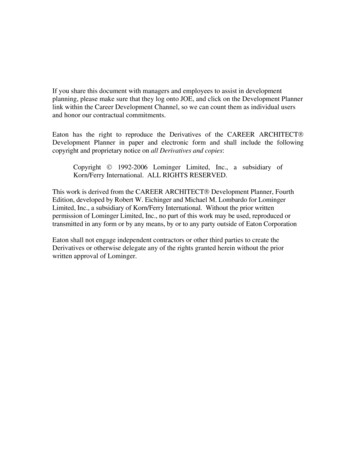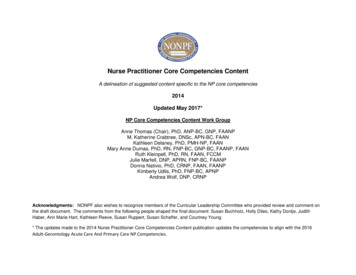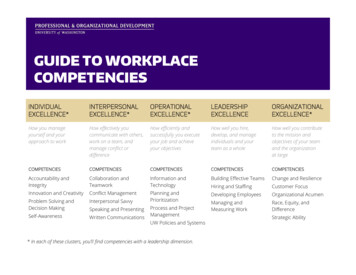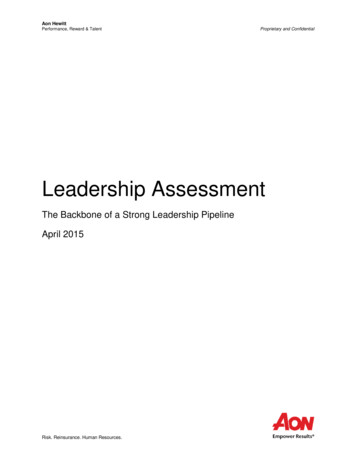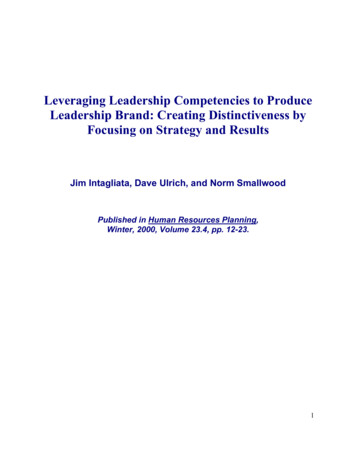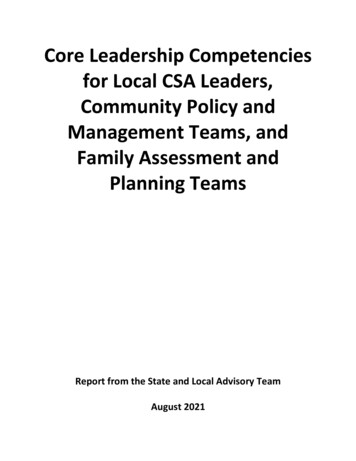
Transcription
Core Leadership Competenciesfor Local CSA Leaders,Community Policy andManagement Teams, andFamily Assessment andPlanning TeamsReport from the State and Local Advisory TeamAugust 2021
This page left intentionally blank2
Introduction:Item 292 H. of the Appropriation Act which directs that “in the odd-numbered years, the StateExecutive Council shall biennially publish and disseminate a progress report on services forchildren, youth, and families and a plan for such services for the succeeding biennium.” Thisplan has been referred to as the SEC Strategic Plan.In accordance with this directive, in December 2019, the State Executive Council for Children’sServices (SEC) adopted and disseminated the Strategic Plan (the Plan) for the 2021-2022biennium. The Plan was developed through a series of meetings and activities including surveysof key stakeholders, focus groups with impacted constituent groups, and facilitated discussionsof the SEC. A determination was made that in addition to a two-year plan, a longer rangeperspective would be included. Therefore, activities and metrics were developed for both twoand four-year time frames for each of the three major goal areas, and six associated objectives(two in each goal area).This report addresses the goal area of Leadership and Collective Action which states “In orderto promote alignment, we will lead by example and collaborate on a shared vision and keyoutcomes.” One of the two specific objectives is “the SEC and the SLAT (the State and LocalAdvisory Team established under §§ 2.2-5201 and 2.2-5202 of the Code of Virginia) will defineand support development of Core Leadership Competencies for Local CSA Leaders, CommunityPolicy and Management Teams, and Family Assessment and Planning Teams The two yearmetric associated with this objective is to “identify desired core leadership and operationalcompetencies and assess current training plans.”In response to this objective, the SEC charged the SLAT with addressing this metric. The SLATconvened a working group consisting of ten SLAT members, staff of the Office of Children’sServices, and additional local CSA Coordinators. The group was chaired by Jessica Webb,Assistant Director of Social Services / CSA Coordinator for Prince William County and KristiSchabo, CSA Administrator for Chesterfield County and the City of Colonial Heights. Thecomplete membership of the working group can be found in Appendix A of this report.The work group has developed the following products to be found in the body of this report: Definitions and descriptions of core leadership and operational competencies for localCSA Coordinators, members of the Community Policy and Management Team (CPMT),and members of the Family Assessment and Planning Team (FAPT)A description of the “Characteristics of a High Functioning CPMT”3
A set of sample interview questions for use when a locality is hiring a CSA CoordinatorRecommendations for the next steps in addressing the four year metric for thisobjective, “Implement a comprehensive curriculum to address identified core leadershipand operational competencies and a strategy for building local implementation of thecompetencies.”The substantive work products reflected in this report were presented to the SEC at its June2021 meeting, adjustments based on feedback were made, and the SLAT endorsed this finalreport at its August 2021 meeting.4
CHILDREN’S SERVICES ACT COORDINATORThe Children’s Services Act (CSA) Coordinator is a unique role and varies by locality. The CSA Coordinator sub-committee focused onthe identification of leadership and operational competencies based on feedback from CSA Coordinators from a variety of small, midsize, and large localities. The feedback indicates several consistent themes in these competencies that are important, regardless oflocality size and structure of the CSA program. Most (82%) of the respondents to a survey of current incumbents have been in theirrole for more than one year, with approximately one-half of those having been in the role five or more years.Core Leadership CompetenciesCompetencyComponents of ritten and Verbal) Ability to be clear and succinct when presenting Sample Interview Questions for CSA Hiringinformation to FAPT members, CPMT members, caseManagers (Attachment B)managers, youth, and families Engage in active listening with others Develop rapport with key stakeholders in CSA Asking questions for additional information orclarification Be aware of non-verbal communication such astone, body language, hand gestures, etc. Open-mindedness Demonstrate respect toward others Ability to adapt communication style andunderstand communication style of othersCollaborative Skills Ability to work with others in a respectful manner Accept and appreciate the various perspectives ofteam members, youth, and families Openly share information5 Sample Interview Questions for CSA HiringManagers (Attachment B)
Core Leadership Competencies Consensus-building Effectively work with people from a variety of CSAstakeholder groups Sample Interview Questions for CSA HiringManagers (Attachment B)Solution-focusedProblem Solving Ability to identify a problem and identify solutionsthat mitigate the problem in a manner that has apositive or best outcome with the least negativeimpact Be open to brainstorming with others Recognize there may be more than one good solution Strength-based perspective Set SMART goals Ability to think critically and creatively Sample Interview Questions for CSA HiringManagers (Attachment B)Organizational Skillsand Multi-tasking Utilize tools such as calendars, reminders, to-do liststo prioritize and manage responsibilities Consistently meeting deadlines Delegation of responsibilities as appropriate Ability to prioritize and re-arrange Ability to adjust to change and the “unexpected,”while maintaining professionalism Use time and resources effectivelyProgramManagement Ability to apply policy to operational procedures6
Core Leadership Competencieso Navigate and interpret policies from OCS andpartner agencieso Apply policy to day-to-day operationso Apply policy consistently across agencies Strong understanding of CSA eligibility and CSAfunding considerations Contract managemento Ability to negotiate contract terms and conditions(Note: may be done in conjunction with CPMTand/or locality purchasing or legal official) Data management and analysiso Ability to collect, organize and report data relatedto outcomeso Provide data feedback to CSA stakeholderso Use data to drive decision-making with a goal ofmeaningful and measurable outcomes Understanding of necessary documentation neededin CSA case files Understanding of CSA audit components Ability to supervise others, as needed Commonwealth of Virginia Learning Center(COVLC) modules for CSAhttps://covlc.virginia.gov/o CSA031 – CSA034 CSA Policy Manual and CSA Guidance yGuides CSA Coordinator’s Academy and iningMaterial/0 CSA Self-Assessment nt/Index/0o Recommended at hire for any newCoordinator to complete with CSAstakeholders OCS Helpdesk State Agency siteso VDSS Foster Care Policy .cgio Department of Juvenile Justiceo Department of Education Sample Interview Questions for CSA HiringManagers (Attachment B)Human ServicesKnowledge andApplication Fundamental understanding of public child-servingagency connections to CSA7
Core Leadership Competencies Comprehensive knowledge of local communityresources and services Ability to identify service gaps Resources for Special Education, Child in Need ofServices (CHINS), Adoption Assistance andFostering Futures Department of Medical Assistance Services(DMAS) Build on the knowledge of your team members(FAPT/CPMT/staff)o Magellan of Virginia Child and Adolescent Needs and Strengths(CANS) Assessment Training and Resourceso https://www.schoox.com/login.phpo https://www.csa.virginia.gov/Cans/Index Virginia Family Network Sample Interview Questions for CSA HiringManagers (Attachment B) Understand the fundamentals of CSA LEDRS reportingelements Ability to develop and manage a program budgetFinancial Knowledgeand Application Management of purchase orders, invoices, payments,financial reconciliation Basic understanding of accounting principles8 Funding and Financial Reporting idance COVLC module for CSA Financial Procedures forLocal Government – CSA041https://covlc.virginia.gov/ Sample Interview Questions for CSA HiringManagers (Attachment B)
RECOMMENDATIONS1. OCS should identify specific training materials that support a CSA Coordinator’s foundational understanding of core operationalcompetencies.a. CSA Coordinator training materials should be organized by operational competency and clearly identified on the OCS website.b. Any updates to training materials and/or location should be updated on this document under the Resources column.2. CPMTs and/or hiring managers for the CSA Coordinator position are encouraged to use this document as a guide when makinghiring decisions.9
10
COMMUNITY POLICY AND MANAGEMENT TEAM (CPMT)The CPMT sub-committee focused on CPMT as a leadership body. Local CPMT membership is directed by § 2.2-5205, thereforeindividuals become CPMT members based on their local leadership positions. Based on CPMT’s oversight responsibilities within alocal CSA program, the team’s collective leadership is crucial to the success of the program.The sub-committee developed a guidance document “Characteristics of a High Functioning CPMT” (See Attachment C) to guidelocalities to review and strengthen their CPMTs. It is highly suggested that local CPMTs establish an annual process for reviewing aCPMT’s level of functioning based on CPMT’s “powers and duties” as outlined in § 2.2-5206.As part of its work, the CPMT sub-committee initiated a local CPMT survey. The results included local feedback about what is neededto support a CPMT’s success and included comments such as the following:-“Increased racial and cultural equity on the CPMT to more closely reflect the demographics of the children served byCSA funding.”“Local officials strengthening their knowledge of CSA and their engagement with CPMT members.”“Balancing of time and primary job responsibilities with the time needed to take action on improvement initiatives.”Core Leadership CompetenciesCompetencyLeadershipAuthorityCSA KnowledgeComponents of CompetencyResource(s) Authority to make decisions within the member’sagency Ability to implement system changes within themember’s agency Appointed to CPMT by local governing body Required Membership of Local hapter52/section2.2-5204/ Understand core principles of the Children’s ServicesAct Understand roles and responsibility of the CPMT Commonwealth of Virginia LearningCenter (COVLC) modules for CSAhttps://covlc.virginia.gov/11
Core Leadership CompetenciesLeadership Skills(Linked to CPMTResponsibilities)Engagement System of Care principles and practices CSA User Guidewww.csa.virginia.gov/Resources/PolicyGuides CSA Policy Manualwww.csa.virginia.gov/Resources/PolicyGuides CPMT Powers and chapter52/section2.2-5206/ Professional experience and working knowledge ofchild-serving, system of care networks Experience developing and implementingadministrative and fiscal policies for multi-agencyprograms Ability to develop and facilitate long-range,community-wide planning efforts Knowledge of quality assurance/improvementprocesses utilized for accountability and outcomes forlarge public sector programs Experience with review and analysis of data inprogram evaluation Experience with management and oversight ofprogram budgets CPMT Powers and chapter52/section2.2-5206/ Attend CPMT meetings regularly Participate in discussions on agenda items Characteristics of a Highly FunctioningCPMT (Attachment C)12
Core Leadership Competencies Ability to work collaboratively within a multi-agencyoversight boardRECOMMENDATIONS1. OCS should identify specific training materials that support a CPMT member’s foundational understanding of CPMT’s role withinthe Children’s Services Act.a) CPMT training materials posted on the OCS website and clearly identified for CPMT members.b) The Annual CSA Conference should offer a half-day training session for CPMT members (as it does for CSA Coordinators)c) The Annual CSA Conference should identify specific trainings offered recommended for CPMT members. (CPMT-U)2. OCS should develop a model CPMT Chair job description3. SEC/OCS should help develop strategies for local CPMTs to recruit, retain and support parent representatives’ active participationin local CPMTs4. SEC/OCS should develop strategies to assist rural CPMTs. One strategy could be to develop a Rural Locality Round Table orWorkgroup to address challenges and barriers inherent to rural localities13
14
FAMILY ASSESSMENT AND PLANNING TEAM (FAPT)Core Leadership CompetenciesCompetencyComponents of CompetencyResource(s)Effectivecommunicationskills Ability to be clear and succinct when presenting CSA Conference break-out rces/TrainingMaterial/1) Engage in active listening with others Develop rapport with youth, families, and serviceproviders Ask questions for additional information orclarification Awareness of non-verbal communication such as tone,body language, hand gestures, etc. Ability to maintain an open mindset Demonstrate respect toward others Understand cultural competency Ability to adapt communication style and understandcommunication style of others Demonstrated ability to take the perspective of otherswithout blaming, shaming or passing judgmentGeneralunderstanding ofthe CSA and thefunction of FAPT Knowledge of the CSA from a state and localperspective Knowledge of CSA eligibility requirements Demonstrated knowledge of how youth & familiesmay access the CSA/FAPT process (generally and intheir respective locality)15 Code of Virginia, Chapter 52.Children’s ServicesAct: https://law.lis.virginia.gov/vacode/2.2-5200/ The Policy manual for the Children’s Services s Office of Children’s Services Resource Section:https://csa.virginia.gov/
Core Leadership Competencies Local policy review Commonwealth of Virginia Learning Center(https://covlc.virginia.gov/Default.aspx)o CSA031 – CSA basics for CPMT – The bigpictureo CSA032 – CPMT & FAPT roles andresponsibilitieso CSA033 – CSA funding and eligibility for CPMTmemberso CSA001 – Can CSA pay?o CSA42 – CSA Parental Agreementso CSA020 - Special education wraparoundfunding under the Children’s Services ActAbility to functionas a part of a team Ability to work with others in a respectful manner Accept and appreciate the various perspectives ofteam members, including youth and families Openly share information Ability to build consensus Ability to effectively work with people from a varietyof CSA stakeholder groups Commitment to engage in discussion and serviceplanning efforts Willingness to validate and honor the youth andfamilies’ perspectives and experiences16 CSA Conference break-out ngMaterial/1)
Core Leadership CompetenciesSolution-focusedmindsetService planningskills Ability to identify a problem and identify solutions that CSA Conference break-out ngMatemitigate the problem and remove potential barriersrial/1) Willingness to brainstorming with others Recognition that there may be more than one possiblesolution Strength-based perspective Ability to think critically and creatively Understanding of how to set goals and objectives thatare SMART (Specific, Measurable, Achievable, TimeBound Knowledge of specific services and their relevance tothe goals and objectives of the plan Extensive knowledge of private providers within thecommunity and around the state Comprehensive knowledge of local communityresources and services including how they areaccessed17 CSA Conference break-out ngMaterial/1) Virginia Commission on Youth Collection ofEvidence-based Practices for Children andAdolescents with Mental Health TreatmentNeeds, 7th Edition(http://vcoy.virginia.gov/collection.asp)
FAPT MEMBER POSITION SPECIFIC COMPETENCIESLOCAL SOCIAL SERVICES (LDSS) REPRESENTATIVECompetencyComponent(s) of Competency Ability to provide an overview of DSS services and theways in which the LDSS can support families Knowledgeable of court orders, best interest of thechild, child safety, protective orders, foster caresystem and related issues, child welfare system, childprotective services, treatment plan development, andcommunity resourcesExtensive Knowledgeable of benefits available through DSS andknowledge of VDSShow youth and families may access these benefitsand LDSS function Working knowledge of DSS technology systemand child welfare Provides information to case managers and thetopics.community about what DSS provides and offers,including the focus on child safety18Resource(s) Virginia Department of Social Services(https://www.dss.virginia.gov/) Commonwealth of Virginia Learning Center(https://covlc.virginia.gov/Default.aspx) LDSS onboarding training modules CSA011 CSA for New LDSS Staff Modules 1-5o Module 1 - Basic background and design of CSAo Module 2 - Family Assessment and PlanningTeam3o Module 3 - Eligibility under the CSA withspecific focus on children receiving the fullrange foster care services to includingprevention, independent living, non-custodialarrangements and traditional entrustments.o Module 4 - Service provision through the CSAfundingo Module 5 - Treatment foster care level system,utilization management and review, and therole of FAPT in adoption assistance cases
CompetencyExtensiveknowledge of thestate and localCourt Services Unitfunction andjuvenile justicetopics.FAPT MEMBER POSITION SPECIFIC COMPETENCIESCOURT SERVICES UNIT (CSU) REPRESENTATIVEComponents of Competency Provides information about court-related issues andprograms, as well as knowledge of the legal system. Knowledge about CSU, court system, probation,parole, and juvenile justice issues Provides expertise in resources and services availablethrough the court system and how youth & familiesmay access these resources Assesses services related to the rehabilitation of youth,recommending least restrictive consequences toensure community safety and rehabilitation Reviewing complaints received by the police, DSS,Schools, and individual agencies within thecommunity, while making decisions as to how and ifthese matters will proceed in the court system Describe the ways a youth and family may beconnected to the CSU, DJJ, etc.19Resource(s) Virginia Department of Juvenile Justice(http://www.djj.virginia.gov/) Commonwealth of Virginia Learning Center(https://covlc.virginia.gov/Default.aspx)o Juvenile Justice specific training modules Local Court Services Unit training hours CSA Conference break-out ngMaterial/1)
CompetencyFAPT MEMBER POSITION SPECIFIC COMPETENCIESCOMMUNITY SERVICES BOARD (CSB) REPRESENTATIVEComponents of CompetencyResource(s)Extensiveknowledge of thestate and localCommunityServices Boardfunction and Knowledgeable of CSB mental health services Fields inquiries about mental health issues, substanceuse, medications, and therapy as it relates to theUtilization Review and review of CANs Educates the team on mental health/substance useissues, treatment, and its effectiveness Virginia Association of Community ServicesBoards (https://vacsb.org/) VACSB conferences and trainings gscalendar/) STEP Virginia core competency trainingschildren’s mentalhealth topics. Knowledgeable about emotional and behavioralconcerns and options for treatment and how youthand families may access these services Knowledgeable of peer support services available atCSBs and how to access them Assists parents/guardians with linking services foryouth Free CSB Virginia training(https://psychotherapy.net) Regional Training Consortium20
FAPT MEMBER POSITION SPECIFIC COMPETENCIESPUBLIC SCHOOL DIVISION REPRESENTATIVE Inquires whether the child is eligible for specialeducation or other school services Explains different types of placement options andspecialized services in the public school setting Knowledgeable about federal and state specialeducation regulations and how to access supportservices through the public schools Knowledge of general resources available through thepublic schools and within the community Inquiries about education, private day placements,Extensivetruancy, and school performanceknowledge of the Review potential educational services through IEP andlocal public-schoolprovide expertise relative to the limits and resourcespractices and topicsof what the school system can providerelated to public Duties include checking compliance with IEPs,education, specialdiscussing future educational goals, referral to childeducation, instudy for students eligible for special education or 504particular.plan. Assists team in ensuring the child’s educational needsmeet relevant regulations and standards Knowledgeable of school-related prevention, schoolattendance, behavior issues in school, servicesprovided within the schools, talented and giftedprograms, rights and testing options, school transitionissues, and any factors affecting the safe andsupportive environment for students Responsible for inquiring about the status of the IEPtransition planning for age-appropriate youth21 Virginia Department of Education - ial ed/) Special Education and the Children’s Services Act(CSA) - Guidance for Community PolicyManagement Teams (CPMT), Family Assessmentand Planning Teams (FAPT), CSA Coordinators,and Local School ial Education and CSAGuidance for CPMTs FAPTs CSACoordinators Local School Divisions.pdf
Inform the parent/caregiver of required procedureswithin the IEP transition planning process, i.e. invitingentities like DARS, the CSB, etc.22
FAPT MEMBER POSITION SPECIFIC COMPETENCIESPRIVATE PROVIDER REPRESENTATIVEExtensiveknowledge of avariety of mentalhealth, foster care,and educationalservices availablewithin thecommunity as wellas the topicsrelated to licensureand regulatorypractices governingprivate serviceproviders Knowledgeable of mental health services and/oreducational services Inquires about appropriateness of services, provider’sresponse to the treatment goals, progress towardstreatment goals, and quality of documentation as itrelates to the Utilization Review and review of CANS Discuss/educate the team on various treatments andits effectiveness Knowledgeable about emotional, educational, andbehavioral concerns and options for treatment Assist FAPT in identifying services for youth and theirfamilies23 CSA Conference break-out ngMaterial/1)
FAPT MEMBER POSITION SPECIFIC COMPETENCIESPARENT/FAMILY REPRESENTATIVELived experiencewithin the CSAand/or childserving system anda willingness toshare theirexperience withother parentsinvolved in theCSA/FAPT process. Provides support to family members before, during,and after FAPT reviews Keeps track during the FAPT meeting of familyengagement issues that may arise Tend to the needs of families during FAPT in terms ofunderstanding the language and issues raised forservices Validate the parent/caregivers’ perspective Offer Celebrations of the youth and family’s progress Ensure FAPT members are using language and tonesthat are youth and family friendly Assist with having difficult conversations Inform of community resources and how to accessthem CSA Conference break-out ngMaterial/1) The Virginia Family twork/)RECOMMENDATIONS1. Development of a FAPT member specific training series to be housed on the Commonwealth of Virginia’s Learning Center (Office ofChildren’s Services).2. Development of team function specific trainings (communication and collaboration, service planning, family engagement, conflictmanagement) to be housed on the Commonwealth of Virginia’s Learning Center (Office of Children’s Services).3. Development of a FAPT retreat resource manual that includes ideas and suggestions for FAPT specific trainings and activities (Officeof Children’s Services/CSA Coordinator’s Network)4. Provide discounted rates or stipends so local FAPT members can attend the CSA Annual Conference (Office of Children’s Services)24
Appendix ASLAT Leadership and Collective Action Working GroupCo-Chairs:Jessica WebbAssistant Director of Social Services/CSA Coordinator, Prince William CountyKristi SchaboCSA Administrator, Chesterfield County-City of Colonial HeightsGroup Members:Lesley Abashian*Director of Human Services, City of Fairfax; SLAT ChairMartha Carroll*Director, 16th District Court Services Unit, Virginia Department of Juvenile JusticeDeDreama HarrodCSA Director, New Kent CountySharon MinterChief of Family Systems (CSA), City of AlexandriaAudra MorrisChildren’s Services Manager, Powhatan CountyAngela Neeley*Executive Director of Special Education, Culpeper County Public SchoolsLaura Reed*Behavioral Health Manager, Virginia Department of Medical Assistance ServicesZandra RelafordAssistant Director, Office of Children’s Services* Indicates SLAT Member25
26
Appendix BSample Interview Questions for CSA Coordinator Hiring ManagersLeadership Competency Questions: What are your strengths and areas for growth as a communicator? Who or what helped youto develop your strengths? How are you addressing your areas for growth? Do you adapt your communication style for the communication style of others? If so, how? What do you consider to be the most important components of effective communication?Provide an example of how you have used those strategies for success in a situation whereyou had to communicate difficult information and what was the outcome? The role and tasks of the CSA Coordinator requires sophisticated systems knowledge,dependability, flexibility, efficiency, and strong collaboration skills. Describe a scenariowhere you have demonstrated these characteristics or skills on a project. Which of thesecharacteristics or skills is the most challenging for you at this time in your professionaldevelopment and why? In your experience, what is the key to developing a good team? The CSA Coordinator is often responsible for facilitating meetings and interactions wheremultiple stakeholders with different perspectives are involved. What do you see as theopportunities and challenges in working with multi-disciplinary teams? Please provide anexample of how you have successfully collaborated within a team setting. Participating in the process of receiving, processing and integrating feedback is an essentialpart of professional development within teams. First, describe a project where you havesolicited and then processed and integrated feedback towards the success of the effort.Second, describe the most challenging feedback you have received in terms of yourpersonal work performance and how that information has informed or affected yourprofessional identity and development. Provide an example of when you thought “outside of the box” to solve a problem. Whatwas your idea and what was the outcome? Please describe a project/assignment when you worked to develop and implement SMARTGoals. Please tell us about the goal, how it met the definition of SMART and how youcontributed to the progress or achievement of that goal. The CSA Coordinator is often in a position where there is not a clear answer or solution to asituation. What are strategies you use when approaching a problem, and provide anexample of when you have used those strategies for a successful outcome? Provide an example of a large-scale or time-sensitive initiative that you led and successfullyimplemented, the strategies used to accomplish this task, and lessons learned. Pleasedescribe the project management, problem solving and evaluation skills that you used.a. Describe the initiative and its rationale.b. How were stakeholders engaged in the process?27
c. What was the methodology employed for monitoring & evaluating the outcomes of theinitiative? How were these findings communicated to leadership?Tell us why the timeliness of documentation is important. Give us an example of how youkeep track of documentation deadlines.The CSA Coordinator position is one that faces the complexities of “managing from themiddle”. You may be in a position where you have a lot of responsibility and accountabilitybut little authority over program components and participants. What does managing fromthe middle mean to you? Please provide an example where you had to manage from themiddle, to include strategies used, lessons learned, and outcomes?Operational Competency Questions: Please tell us why you applied for this position and what educational and/or workexperience you possess that qualifies you for this position? What experience do you have with policy development and/or application? What experience do you have with data management and analysis? In your experience,what are key
The work group has developed the following products to be found in the body of this report: Definitions and descriptions of core leadership and operational competencies for local CSA Coordinators, members of the Community Policy and Management Team (CPMT), and
